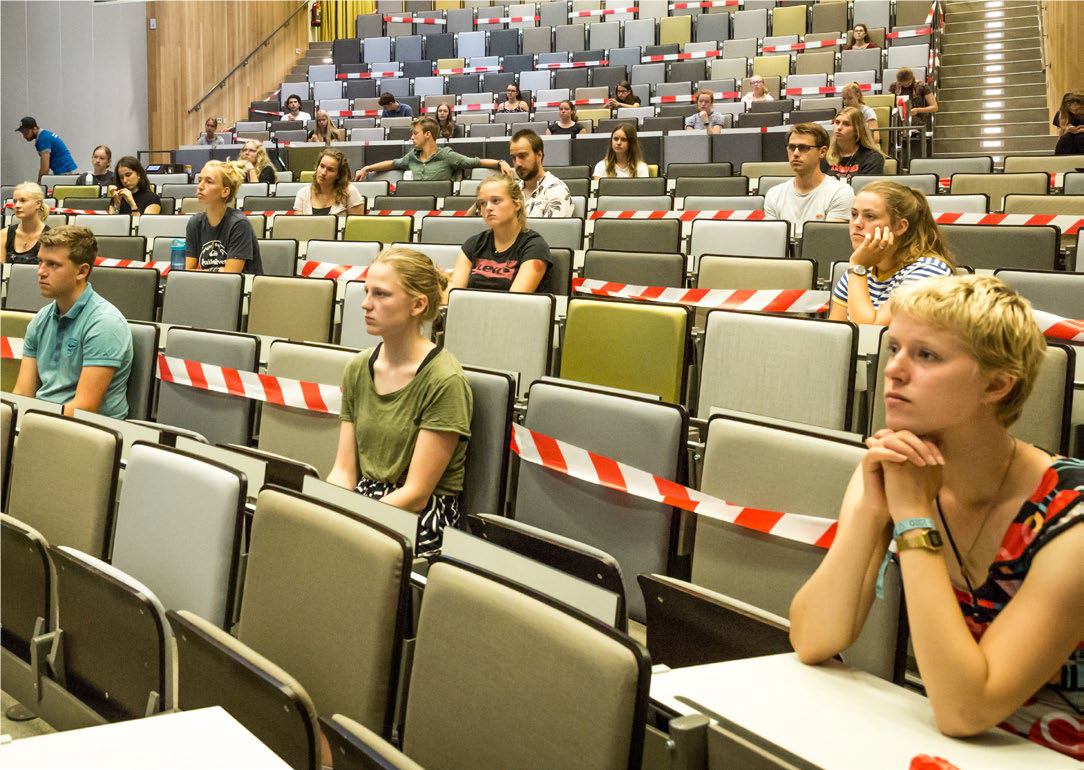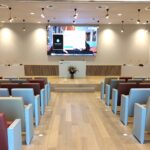The university is working with ‘blended education’: a lot of online courses
combined with 25 per cent delivered in small classes on campus. So what
is this academic year going to look like for first-year students? Resource
investigated.
Ariëtte van Knegsel is one of the coordinators of the firstyear course Health, Welfare and Management for the MSc in Animal Sciences. This is a compulsory course for about 80 to 100 students, half of whom are international. The course is traditionally organized with a reader, a lot of course material, five weeks of lectures and an individual written assignment. As many as 12 teachers contribute to the course.
Due to the Covid-19 measures, it originally looked as though the course would go fully online for the coming academic year: either ‘live’ in virtual classrooms, or using recorded lectures from 2019, accompanied by online question-and-answer sessions. ‘Luckily, it seems that teaching on campus is possible now, but with all the coronavirus rules, you can only have 17 students in a classroom,’ says Van Knegsel.
It has now been decided to divide the students into five groups of 17. They can take it in turns to attend a lecture on campus and ask questions in person. The other groups listen to the lecture online and can ask questions via Teams. ‘To make sure this goes smoothly, there is a moderator for every class who passes questions on to the teacher.’
Evenings too
Many teachers have been working over the summer on making their courses ‘corona-proof’. This involves complying with the Dutch government’s coronavirus rules and with the university’s 14 ‘design principles’ for Wageningen education. WUR has opted for blended education in which students attend small classes on campus. Because of the coronavirus restrictions, the capacity of the teaching accommodation is only 25 per cent of the usual numbers, so the courses have been distributed over the entire teaching period – including the weeks usually reserved for revision and for exams – between 8:20 and 19:20. According to Education and Student Affairs, the first-year students will spend half a day on campus twice a week, on average, and will be taught online at home for the rest of the time. The new timetable will be published at the end of August.
Even though it is made up of lectures rather than tutorials, the Health, Welfare and Management course will be allocated space on campus because it is a first-year course and the teachers think the interaction with the students is very important. But if the risk of spreading the coronavirus increases, the course can easily be converted to ‘online only’. ‘All the lectures will be recorded as well,’ says Van Knegsel.
Pity
The core courses on Mathematics and Statistics will be run entirely online this academic year. Much to course teacher Eric Boer’s distress. ‘With online education you get less idea of whether students understand and whether they are keeping up.’ The tutorial groups and intensively supervised computer practicals will be replaced by online supervision via Microsoft Teams. Boer: ‘That way we hope to get interaction with students after all, and to monitor whether students can follow us. The tutorials are recorded and a discussion forum, self-tests and extensive feedback are available.’
Students have to hold the glassware in their hands
Boer would have preferred to teach on campus, but he is not complaining. ‘I understand that we are going fully online for practical reasons. We give the same course on several degree programmes. That makes it difficult to coordinate things with all the programme directors. What is more, we now create space for all the more subject-oriented courses.’
One such subject-specific first-year course is Introduction to International Development Studies on the International Development programme. Daniëlle Teeuwen coordinates this course, which consists of lectures, tutorials, a course on academic skills, and guest lectures. ‘From the beginning of September, only the tutorials will be on campus,’ says Teeuwen, ‘because that’s where the interaction takes place.’
In practice the six campus hours available for this course turn out to be hard to organize: because of the coronavirus rules, the tutorial groups have to be small. Teeuwen: ‘That doubles the number of tutorials and there are only two hours of tutorial time per group per week on campus. And you can’t divide up the other components.’
Practicals
Other programmes get a more generous allocation. The BSc programme in Biotechnology, for instance, offers first-years the course Organic Chemistry 2. This course is made up of online lectures and practicals that are taught on campus. ‘Our priority lies with the practicals,’ says teacher Maurice Franssen. ‘The students need to learn the techniques, so they must hold the glassware in their hands. We want to look over their shoulders to see how they do.’
That is why first-year Biotechnology students will be getting 20 hours of practicals on campus over a period of four weeks. Franssen struck lucky. ‘Not all the degree programmes can get that many hours of practicals on campus. The Biology and Nutrition & Health first-years get 12 of their 20 hours of Organic Chemistry on campus, and 8 hours of practicals are done online.’ Meanwhile, the chemists are now working on a fully online practical, using virtual reality. Franssen: ‘That looks very fancy, but it can’t compete with the real practical.’

 Photo: Anna den Hartog
Photo: Anna den Hartog 

